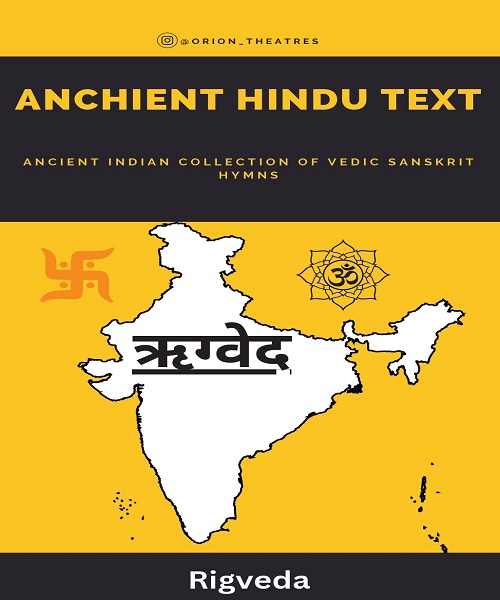ऋग्वेद | Rigveda

⬆️ Cover Page ⬆️
Pride and Prejudice (by Jane Austen):
| Religion | Hinduism |
|---|---|
| Language | Vedic Sanskrit (संस्कृत) |
| Period | 1500–1000 BCE |
| Chapters | 10 mandalas |
| Verses | 10,552 mantras |

Contact Us: ⬇️
⬇️ English ⬇️
⬇️ Hindi + Sanskrit ⬇️
[ NOTE: Click multiple times if the link does not get activated. ]
Summary of Rigveda:
The Rigveda is one of the oldest and most important texts in ancient Indian literature, composed during the Vedic period around 1500–1200 BCE. It is a collection of hymns and sacred verses written in Sanskrit and divided into ten books, known as Mandalas.
The Rigveda serves as the foundation of the Vedic tradition and contains over a thousand hymns dedicated to various deities, natural forces, and cosmic principles. These hymns are composed in a poetic and rhythmic manner, reflecting the spiritual beliefs and rituals of the early Vedic civilization.
The first and second books mainly praise Agni, the fire deity, as a mediator between the gods and humans. The third and seventh books primarily focus on Indra, the king of gods and the bringer of rain and thunder. The fourth book extols Varuna, the guardian of cosmic order and moral law, while the fifth book celebrates the divine knowledge and wisdom of the gods.
The sixth and eighth books contain hymns dedicated to various gods, expressing devotion, praise, and offerings. The ninth book is known for its philosophical hymns and discussions on the nature of existence, the universe, and the concept of truth (Rita). The tenth book consists of hymns related to various deities, rituals, and prayers.
The Rigveda also features historical and mythical references, providing insights into the early Vedic society, customs, and beliefs. It highlights the importance of sacrificial rituals, chants, and prayers in seeking divine blessings and cosmic harmony.
Throughout the Rigveda, there are recurring themes of reverence for nature, the pursuit of knowledge, the relationship between gods and humans, and the aspiration for spiritual enlightenment. The hymns in the Rigveda reflect the spiritual and cultural heritage of ancient India and laid the foundation for later Hindu philosophical thought and religious practices.
As a sacred text, the Rigveda has been preserved and transmitted orally through generations of Vedic priests (Brahmins) and continues to hold profound significance in Hindu religious ceremonies, study, and meditation. Its preservation and interpretation have been vital in maintaining the continuity of Indian culture and spiritual traditions.
[NOTE: The vast knowledge of Rigveda cannot be summarised in some little words. Kindly read it yourself and explore the vedic knowledge.]
!! DISCLAIMER !!
1. No Piracy or Copyright Infringement: The Library is intended to be a lawful resource for accessing digital content, including books, articles, and other materials (“the Content”). We strictly prohibit any form of book piracy or copyright infringement. The Content provided in the Library is not hosted on our servers, we only provide necessary links to the users for their easy access to the information.
2. Legal Purpose: Users of the Library must use the Content solely for lawful and personal purposes. Any unauthorized distribution, reproduction, or commercial use of the Content without proper permission may violate copyright laws, intellectual property rights, and other applicable laws.
3. Intellectual Property Rights: All intellectual property rights related to the Library and its Content, including but not limited to copyrights, trademarks, and trade secrets, are the sole property of this website. Users shall not acquire any ownership or rights in the Content by accessing or using the Library.
4. Third-Party Content: The Library may contain links to third-party websites or content. This website does not endorse or assume responsibility for the accuracy, legality, or content of any third-party websites or materials linked to or from the Library.
5. Disclaimer of Liability: We make every effort to ensure the accuracy and reliability of the Content provided in the Library. However, the Content is provided “as is” without any warranty, express or implied, including but not limited to warranties of merchantability, fitness for a particular purpose, or non-infringement. Users access and use the Library and its Content at their own risk.
This website shall not be liable for any direct, indirect, consequential, punitive, or special damages arising out of or in connection with the use of the Library or its Content, including but not limited to loss of data, profits, or business opportunities.
6. Compliance with Applicable Laws: Users of the Library must comply with all applicable laws and regulations governing the use of digital content, including copyright laws and intellectual property rights.
7. Removal of Content: This website reserves the right to remove any Content from the Library without prior notice if it is found to be in violation of copyright laws or any other legal requirements.
8. Amendments to Disclaimer: This website may update or modify this disclaimer at any time without prior notice. Users are advised to review this disclaimer periodically for any changes.
9. Contact Information: For any questions or concerns regarding this disclaimer or the Library, please contact us at any of our social accounts.
